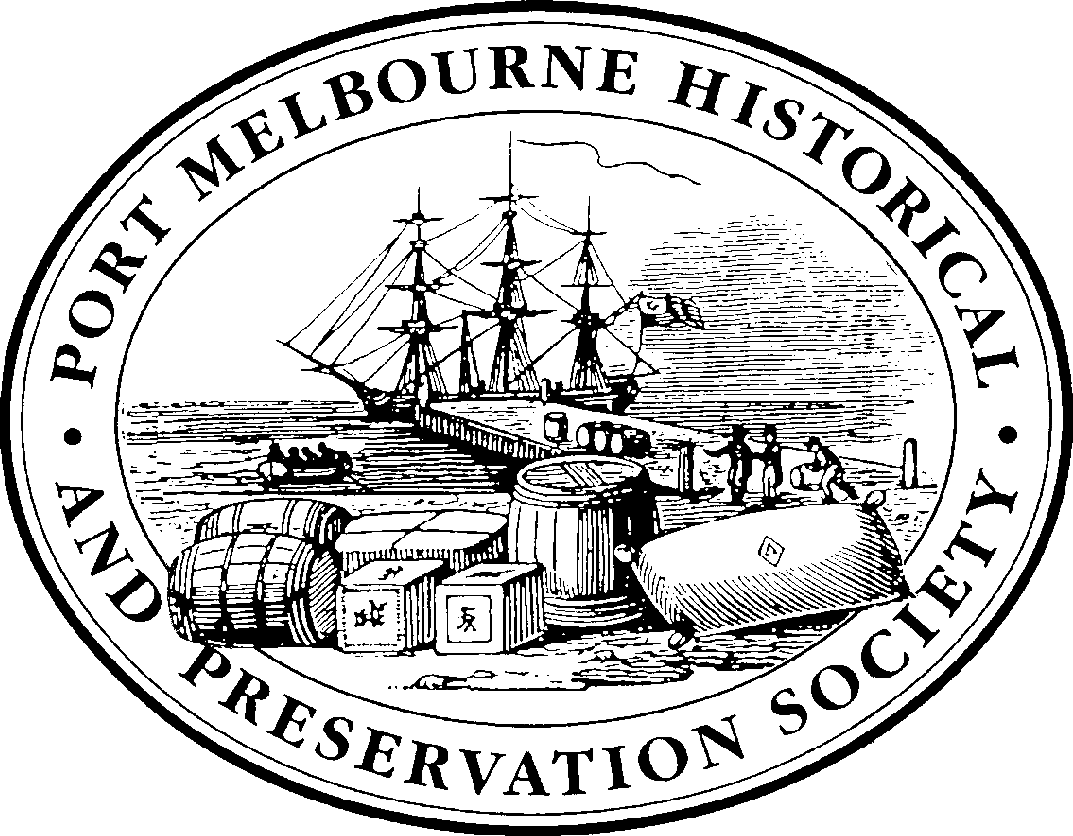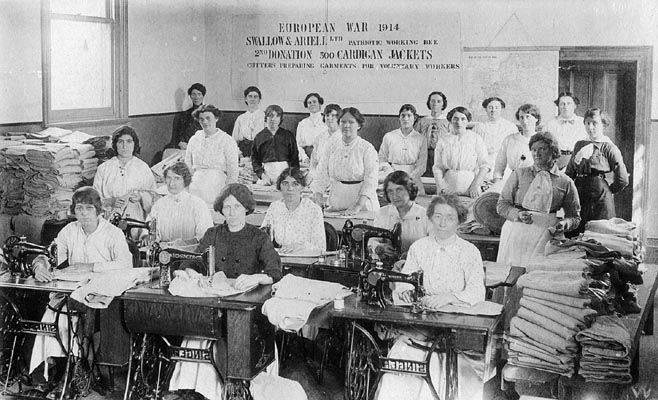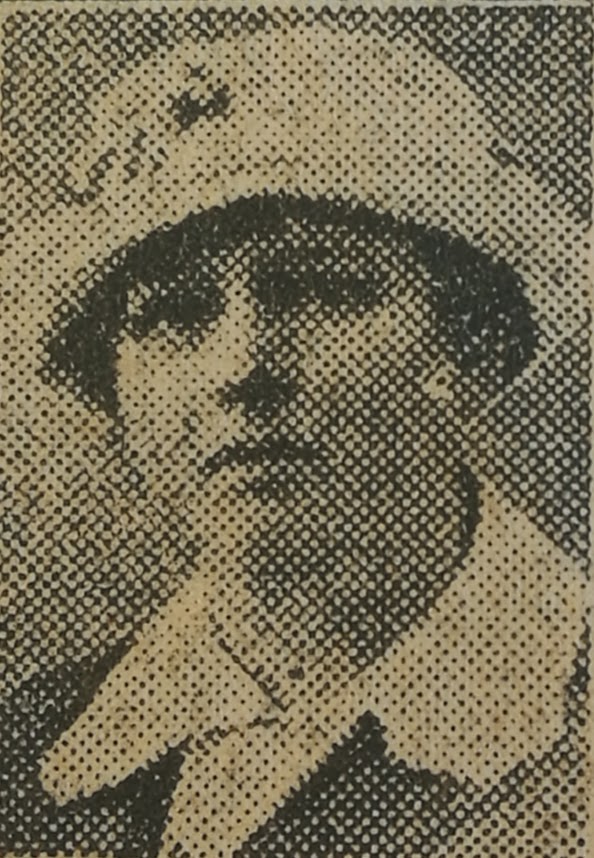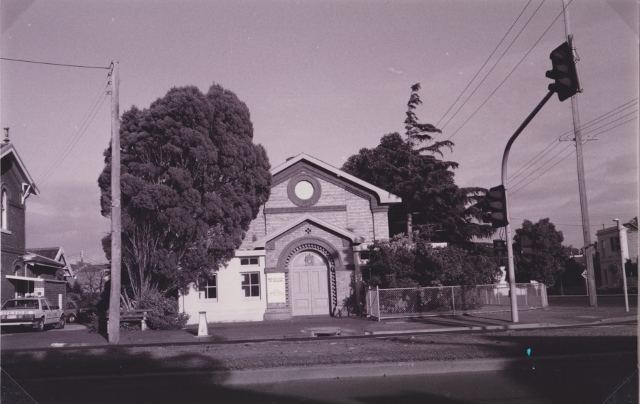Miss Elsie Holmes
Miss Elsie Holmes was a forewoman at Swallow and Ariell, the biscuit manufacturing company, during the First World War. Her father also worked for the company, as did many other people in Princes St where the family lived.
Her exceptional administrative and organisational abilities came to the fore during the First World War. She brought together a group of Swallow and Ariell women employees called the Busy Bees who volunteered their time sewing handkerchiefs, cardigans and shirts for the troops overseas. The Busy Bees were extremely well regarded both at home and by the recipients of their efforts. As many as 300 women were engaged in the work.
Lady Helen Munro Ferguson praised their ingenuity in crafting tiny shoes and hosiery from odds and ends.1
Miss Holmes approached the management of the firm with preferred samples of material which was then donated.
By 1917 the Busy Bees had made 4939 “good luck” shirts, 1545 leather cardigans, 23461 handkerchiefs, 52 pairs of bed socks and 503 cholera belts.2 She also organised ambitious fundraising events and a knitting competition.
Barely a week passed by without a letter of grateful thanks and acknowledgement from the troops overseas. Here is just one example. In mid 1917, Miss Holmes received a letter from Thomas Greenwood AB who worked in the mess on board the HMAS Australia somewhere in the North Sea.
“…I feel that I must at least drop you a line to thank you and your party for the splendid collection of Xmas luxuries that has just arrived aboard. Undoubtedly the good things were intended for distribution at Xmas, 1916, but, as they have been held up at some of the depots down south, they are about eight months adrift. Nevertheless, everything has arrived in excellent order and condition, not one article the worst for the delay. If you could only realise the amount of pleasure and light-heartedness that has resulted, you would certainly be assured that the enterprise was a monster success. That you and all your party of ‘Busy Bees’ may live long lives and very happy ones is the fervent wish of – (Sgd) Thos. Greenwood AB.” 3
The Busy Bees ‘sustained and systematic’ effort was also noted and appreciated by the Minister of Defence.
In just three weeks in 1916, the Busy Bees raised 10,000 pennies which enabled the donation of two fully equipped hospital cots to the Assistance Maternelle Permanents, Paris for women and children in France. 4
Miss Holmes was widely acknowledged as ‘the inspiration and the driving force’ behind the Busy Bees’ efforts. She was respected and admired. She ‘seems to have a genius for discovering the splendid working qualities of the girls and is ably bringing them into effect’.5
Frederick Derham, the Managing Director of Swallow and Ariell, said that she had ‘a very systematic way of going about her work, and has tact in the management of those under her control. Miss Holmes is active, robust and thorough, and her personal character is of the very best. She may be trusted to discharge any duties allocated to her with the most complete fidelity’.
After the war, Miss Holmes was part of a network of patriotic fundraising groups in Melbourne (including the Port Melbourne’s Women Welcome Home Committee) that came together to form the Sister Susie’s Club. The purpose of the club was for wage earning women to continue their voluntary service ‘for the benefit and interest of of those soldiers and sailors who have fought for the Empire’. After all, it would ‘be a pity for their identity to be lost both for their own and for the community’s sake’. She became the Club’s first President.
In recognition of her work with the Busy Bees, Miss Holmes was invested as a Member of the British Empire in the King’s Honours List of October 1920. She also received a bronze medal of the Reconnaissance Francaise from the Consul for France, Monsieur Turck in 1922.
Also in 1920, Miss Holmes went to Moroopna as matron where Swallow and Ariell had young women engaged in fruit canning. When she returned to Port Melbourne, she continued to support local fundraising for a range of organisations.
Miss Holmes was also the City of Port Melbourne Ladies Swimming Club President in 1926.
During the depression, she gathered a group to make clothes for the destitute, and held a fundraiser for the unemployed girls fund.
Miss Elsie Holmes died on 10 June 1945 aged 63 in Parkville, possibly at the Royal Melbourne Hospital, and is buried at Springvale Cemetery. Her funeral was attended by many employees of Swallow and Ariell. The Mayor of Port Melbourne, Councillor Rogers, paid tribute to her extensive community involvements.
The particular circumstances of the First World War and the support of Swallow and Ariell’s management, gave Miss Elsie Holmes an opportunity to put her formidable organisational ability and capacity to the service of others which she continued to do throughout her life for the benefit of the Port Melbourne community.
1 PATRIOTIC FUNDS. (1916, March 8). The Argus (Melbourne, Vic. : 1848 – 1957), p. 5. Retrieved March 13, 2023, from http://nla.gov.au/nla.news-article2094339
2 NEWS OF THE DAY. (1917, October 26). The Age (Melbourne, Vic. : 1854 – 1954), p. 6. Retrieved March 12, 2023, from http://nla.gov.au/nla.news-article155179292
3 ‘”BUSY BEE.”‘, Port Melbourne Standard (Vic. : 1914 – 1920), 4 August, p. 1. ,retrieved March 10, 2023 from http://nla.gov.au/nla.news-article88368007Greenwood 4 August 1917
4SWALLOW AND ARIELL’S BUSY BEE. (1916, July 27). Punch (Melbourne, Vic. : 1900 – 1918; 1925), p. 28. Retrieved March 12, 2023, from http://nla.gov.au/nla.news-article121077917



